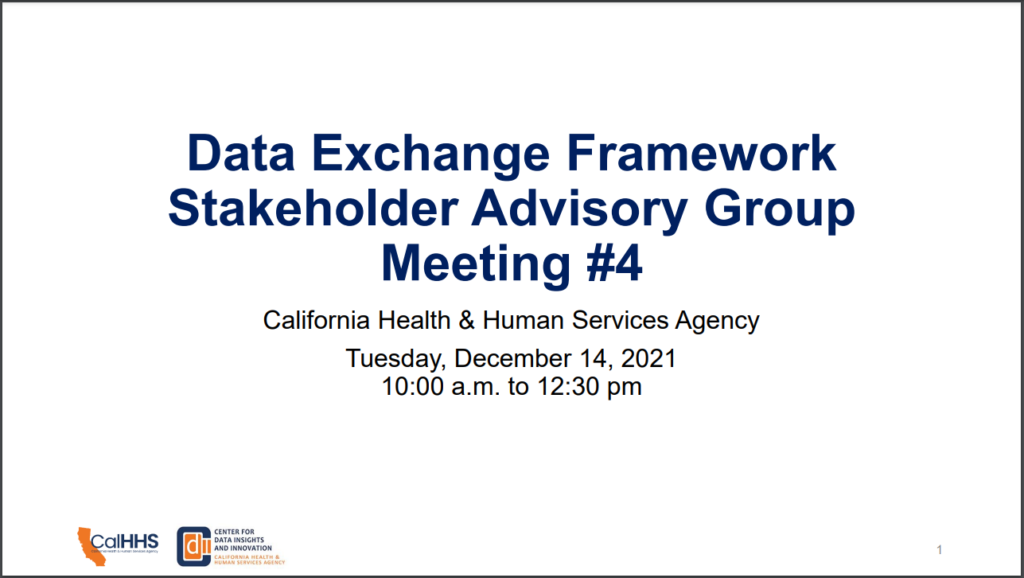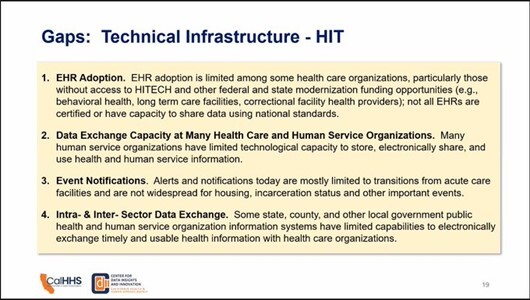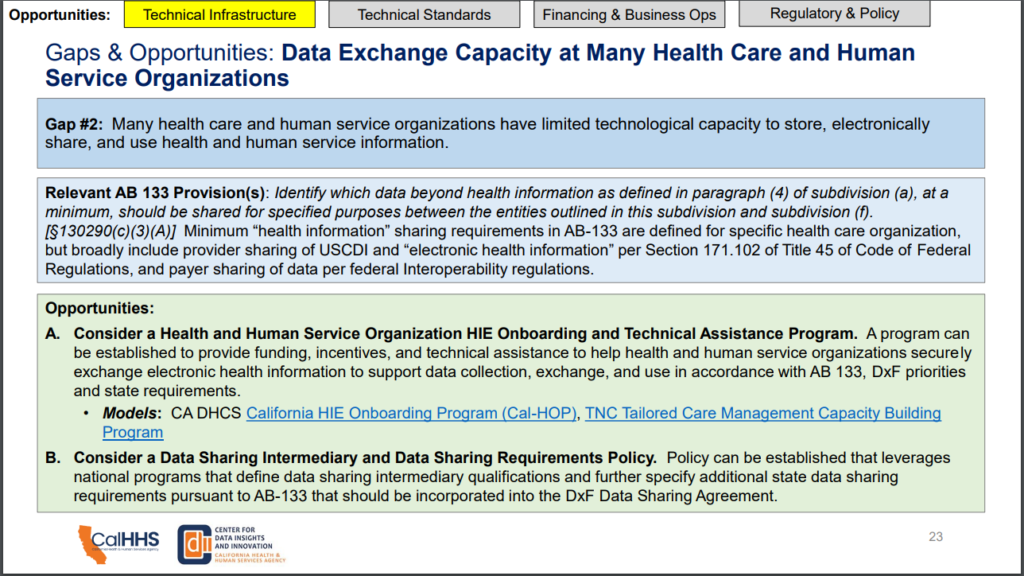
Data Exchange Framework Stakeholder Advisory Group Meeting #4
Funding and incentives to increase data exchange among top areas of discussion
“Systems are not enough. We’ve got to make it a requirement to have incentive programs to support, not just adopt, actual data exchange.”
– Jonah Frohlich, Manatt Health
This week, the California Health and Human Services Agency (CalHHS) held their fourth Data Exchange Framework (DxF) Stakeholder Advisory Group meeting, which specifically focused on gaps and opportunities related to health information technology (HIT). Most of the discussion revolved around funding to close these critical technical infrastructure gaps.

At Manifest MedEx, we are thrilled to see the Advisory Group’s support for the opportunities presented around expanding data exchange capacity (#2) and event notifications (#3). As California’s largest nonprofit health data network, these are areas where we have the depth and breadth of experience in what works – and what doesn’t.
Expanding data capacity
We strongly support the proposals to address the data exchange capacity gap with:
- A program to provide funding, incentives, and technical assistance to help organizations onboard to HIEs, expanding beyond Cal-AIM, which is limited to only the Medi-Cal population
- A policy to qualify data sharing intermediaries, leveraging federal programs requirements, and specifying additional state data sharing requirements per AB 133

Addressing our state’s core data infrastructure challenge with this two-pronged approach are the headwaters for making progress on all other fronts: incenting all providers to adopt interoperable EHRs, fixing event notifications gaps across the delivery system, and building capacity within public health and human service organizations for robust data sharing with the health care community.
On funding, we have seen from the California Health Information Exchange Onboarding Program (Cal-HOP) and other states that financial incentives programs are powerful levers to encourage and enable participation in health information exchange – reducing the burden on providers, especially for solo and small practices. We can both learn from and build on successes in the next round.
Claudia Williams, CEO, MX, shared her recommendations on funding for the proposed HIE onboarding and technical assistance program:
“I think there are 3 distinct things that need to be funded:
-
- Incentives that will go to the providers, similar to what Inland Empire Health Plan (IEHP) has today which motivates folks to move and create the data connections.
- Money to fund the effort needed to make a data connection. In our experience, at least at MX, we bear the full cost of that, because we’re trying to offload the costs from providers (about $8,000 to $10,000 per practice).
- The cost and effort to actually make the data usable – to collect, aggregate, and distill insights from it – and that’s the piece that all of these state programs have never funded.”
From our experience, we need to address and enable all three recommendations to truly achieve the data exchange envisioned in AB 133.
Ali Modaressi, CEO, LANES, echoed support for these proposals and expounded on the need for funding for health information exchange, based on lessons learned from Cal-HOP:
“I totally support the incentive programs as well as the technical assistance. I also want to emphasize that when we talk about technical assistance, other than the incentives, there needs to be full support throughout the entire implementation, covering the costs of some of the additional tools that need to be deployed just to connect to an HIE.”
We also strongly support the deeming of qualified data intermediaries to meet our state’s data sharing mandate while decreasing the burden, cost, and complexity of data exchange. Rather than overly banking on untested federal examples like TEFCA, California should carefully consider what intermediaries like HIEs will require to (1) make health data usable and (2) easily share that data with each other at any time, so it is always available when needed by providers and health plans through a “network of networks.”
Expanding event notifications
The Stakeholder Advisory Group discussed that in much of the health eco-system, event notifications are still limited, despite the federal Interoperability and Patient Access Final Rule, which requires short term-acute care hospitals to send admission, discharge, transfer (ADT) notifications. The Advisory Group was asked to consider additional types of life-stage transition notifications, such as incarceration and change in housing status, that would support seamless, coordinated whole person care.

At Manifest MedEx, we are strongly supportive of event notifications. Currently, we share more than 680,000 ADT notifications per month – each representing an opportunity to better coordinate care for the patient. Event notifications are critical to reducing readmissions and ensuring quality care, especially across multiple sites and providers. If event notifications could be expanded and scaled throughout the state, the improvement in care for Californians would be monumental.
The biggest challenge to this potential game changer in California healthcare is that today, there is great variability in how different providers, hospitals, and healthcare organizations choose to send ADT notifications, hindering true interoperability. For example, a PCP may choose to receive their ADT through an HIE, while a hospital may want to send alerts as (hard to use) direct messages.
“While the federal requirements helped, we’re a long ways from having the data sharing we need. I’d love to see us build into — whatever approach we take to ‘deeming’ or ‘qualifying’ intermediaries — a requirement that we actually share ADT data across different networks. We need to figure out how to share ADT data more broadly.”
The need to share more event notifications was echoed throughout the group. Michelle Doty Cabrera, Executive Director, County Behavioral Health Directors Association of California, highlighted the challenges for counties in getting event notifications and how beneficial alerts from hospitals, health plans, and jails would be for caring for their populations:
“It’s important to note that today, county behavioral health plans are not always notified when a member is in the emergency department, and we understand this may be true for managed care plans as well. If we’re going to improve coordination and follow-up care after an emergency department visit under Medicaid, we really need some basic info and want to flag that is not always happening today.”
Rahul Dhawan, Associate Medical Director, MedPoint Management (representing America’s Physician Groups), provided a physician perspective on the role of event notifications:
“The event notifications really need to go broadly because patients are coming from all walks of life and a lot of care is rendered in very much different places and the usability of the data…is so key and having the actual data is so important. Having these event notifications is just the beginning, but it’s critical to the infrastructure.”
In addition to HIT gaps and opportunities, the Stakeholder Advisory Group also spent some time providing focused recommendations around a digital identities strategy that could support master patient indices. Patient identity and matching capabilities are critical, and in our experience, prioritizing government patient identity management would be an important first step as the potential impact is enormous.
As we approach the halfway mark to these meetings (total of nine), we look forward to the DxF and California Health and Human Services Agency (CalHHS) progress on these fronts and will continue to represent our HIE participants and HIE community, sharing updates from the front line.
For a recap of past meetings, please check out News and Perspectives on our website.
The Advisory Group convenes again in the new year on January 25, 2022 from 10:00 AM to 12:30 PM. We invite you to follow @ManifestMedEx on Twitter for live tweets, share your thoughts with us at https://www.manifestmedex.org/contact/, and stay tuned for more updates!